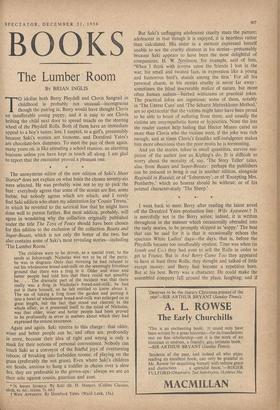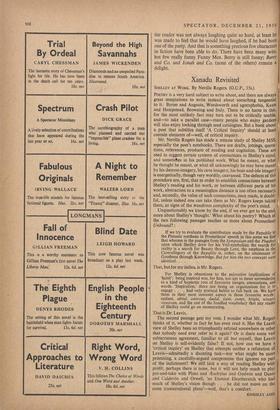BOOK
The Lumber Room
BY BRIAN INGLIS T. idolise both Berry Pleydell and Clovis Sangrail in childhood is probably not unusual—incongruous though the pairing is; Berry would have thought Clovis an insufferable young puppy, and it is easy to see Clovis bribing the child next door to spread treacle on the steering wheel of the Pleydell Rolls. Both of them have an immediate appeal to a boy's tastes; less, I suspect, to a girl's, presumably because Saki's women are tiresome, and Dornford Yates's are chocolate-box dummies. To meet the pair of them again, many years on, is like attending a school reunion, an alarming business unless you have kept in touch all along. 1 am glad to report that the encounter proved a pleasant one.
The anonymous editor of the new edition of Saki's Short Stories* does not explain on what basis the chosen seventy-six were selected. He was probably wise not to try to pick• the best : everybody agrees that some of the stories are fine, some feeble, but nobody agrees which are which; and I rarely find Saki addicts who share my admiration for 'Cousin Teresa,' in which he reverted to the satirical line that he might have done well to pursue further. But most addicts, probably, will agree in- wondering why the collection originally published under the title The Toys of Peace should have been chosen for this edition to the exclusion of the collection Beasts and Super-Beasts, which is not only the better of the two, but also contains some of Saki's most revealing stories—including `The Lumber Room.'
The children were to be driven, as a special treat, to the sands at Jaborough. Nicholas was not to be of the party; he was in disgrace. Only that morning he had refused to eat his wholesome bread-and-milk on the seemingly frivolous ground that there was a frog in it. Older and wiser and better people had told him that there could not possibly be. . . . The dramatic part of the incident was that there really was a frog in Nicholas's bread-and-milk; he had put it there himself, so he felt entitled to know about it. The sin of taking a frog from the garden and putting it into a bowl of wholesome bread-and-milk was enlarged on at great length, but the fact that stood out clearest in the whole affair, as it presented itself to the mind of Nicholas, was that older, wiser and better people had been proved to be profoundly in error in matters about which they had expressed the utmost assurance.
Again and again. Saki returns to this charge: that older, wiser and better people can be,' and often are, profoundly in error, because their idea of right and wrong is only a mask for their notions of personal convenience. Nobody can touch Saki as a conveyor of the fearful joys of overturning taboos; of breaking into forbidden rooms; of playing on the grass (preferably the wet grass). Even where Saki's children are fiends, anxious to hang a toddler in chains over a slow fire, they are preferable to the grown-ups : always we are on their side against cousin, guardian and aunt.
* 76 SHORT STORIES. By Saki (H. H. Munro). (Collins Classics, cloth, 6s. 6d.; rexine, 7s. 6d.)
t WIFE APPARENT. By Dornford Yates. (Ward Lock, 15s.)
But Saki's unflagging adolescent cruelty mars the picture; adolescent in that though it is enjoyed, it is heartless rather than calculated. His sister in a memoir expressed herself unable to see the cruelty element in his stories—presumably because Saki appears to have been the most delightful of companions; H. W. Nevinson, for example, said of him, `When I think with sorrow upon the friends I lost in the war, his small and twisted face, in expression like a young and humorous bird's, stands among the first.' For all his personal charm, in his stories cruelty never far away : sometimes the blind inscrutable malice of nature, but more often human sadism—barbed witticisms or practical jokes. The practical jokes are ingenious; some of them, notably in 'The Unrest Cure' and 'The Schartz Metterklume Method,' are so spectacular that the victims might later have been proud to be able to boast of suffering from them; and usually the victims are unsympathetic bores or hypocrites. None the less the reader cannot help feeling that Hector Munro cared no more than Clovis who the victims were, if the joke was rich enough; and at times Clovis's faunlike self-indulgence makes him more obnoxious than the poor mutts he is tormenting.
And yet the stories, taken in small quantities, survive sus- picion of the author just as Kipling's do. It is difficult to worry about the morality of, say, 'The Story Teller' (also, alas, from Beasts and Super-Beasts: perhaps the publishers can be induced to bring it out in another edition, alongside Reginald in Russia); or of `Tobermory'; .or of 'Excepting Mrs. Pentherby,' which no hostess should be without; or of his pointed character-study 'The Sheep.'
I went back to meet Berry after reading the latest novel off the Dornford Yates production line : Wife Apparent.t It is mercifully not in the Berry series; indeed, it is written throughout in the manner which occasionally obtruded into the early stories, to be promptly skipped as 'soppy.' The best that can be said for it is that it occasionally echoes the spacious White Ladies' days—the days, that is, before the Pleydells became too insufferably opulent. Time was when (in Jonah and Co.) they had even to sell the Rolls in order to get to France. But in And Berry Came Too they appeared to have at least three Rolls; they thought and talked of little except money; and Berry had become a repetitive bore. But at his best, Berry was a character. He could make the assembled company fall around the place, laughing; and if the reader was not always laughing quite so hard, at least lie was made to feel that he would have laughed, if he had been one of the party. And that is something precious few characters in fiction have been able to do. There have been many wits, but few really funny Funny Men. Berry is still funny; Berry and Co. and Jonah and Co. (none of the others) remain a delight.



































 Previous page
Previous page